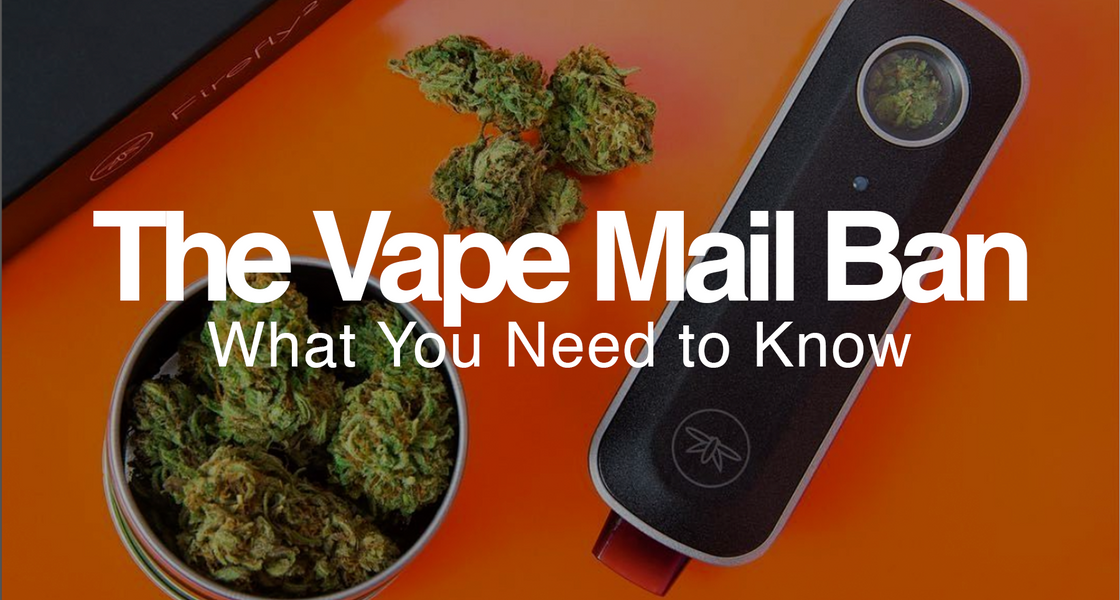Vapes: misunderstood little robots that love to get themselves in big trouble.
On December 27, 2020, Congress passed a COVID Relief Bill you probably remember for being the one that gave out $600 stimulus checks. If you spent your entire New Years Eve reading all 5,500 pages of it, you surely noticed something very off between 5,136 and 5,139.
Plopped on these pages is the “Preventing Online Sales of E-Cigarettes to Children Act” (or “PACT Act” for short).
While the PACT Act may be fun to say, it’s not fun to read— especially if you ever want to buy a vape on the internet ever again.
What is the PACT Act?

The PACT Act is effectively a mail ban on vapes. It prohibits the USPS from shipping vapes and e-cigarettes directly to consumers.
But you can still ship them with UPS and FedEx, right?
Nope. They banned vapes, too.
What Does the PACT Act Mean?
The PACT Act itself was first passed in 2009, as an amendment to “the Jenkins Act.” It originally prohibited USPS from shipping “cigarettes and smokeless tobacco products.”
Basically, it meant you couldn’t send cigarettes in the mail.
December 2020’s COVID relief bill simply amended the act to include “electronic nicotine delivery systems (ENDS).”
The bill defines this as:
“…any electronic device that, through an aerosolized solution, delivers nicotine, flavor, or any other substance to the user from the device.”
That includes:
- E-cigarettes
- E-hookahs
- E-cigars
- Vape pens
- Advanced refillable portable vaporizers
- Electronic pipes
- Any components, liquids, parts, or accessories
The bill continues:
“…the United States Postal Service shall promulgate regulations to clarify the applicability of the prohibition on mailing cigarettes… to electronic nicotine delivery systems.”
“Promulgate” is a fancy word that means, “put it into effect and publicly announce it.”
And… that’s all it says.
...Huh?
Congress is basically saying, “You know how you can’t mail cigarettes and chewing tobacco? Now you can’t mail vapes, either. Any of them. USPS: get on it.”
The truth is, Congress does not understand the products or the stakeholders affected by this regulation.
There was not much care or forethought as to the specific consequences this plan would have on the vape industry.

An important takeaway is that the mail ban is not restricted to just nicotine or tobacco products. It’s any vaporizer that delivers any substance.
This includes dry herb vaporizers, concentrate vaporizers, e-rigs, desktop vaporizers, and more.
The issue of “compliance” is absolutely crucial for any vendor hoping to operate within the counterculture space. It requires a lot of time and resources to keep businesses compliant with the ever-changing landscape of a tightly-regulated industry.
Larger companies have money on their side, and thus have more resources they can allocate. Smaller brands, online shops, and mom-and-pop stores don’t have these luxuries in as plentiful abundance, and they’re the ones who will ultimately suffer the most from the provisions of this bill.
In addition, medical users will be unable to receive the products they need for therapeutic purposes— in some cases, this can be life threatening. Vaporization is often the highest recommended ingestion method for medical users, as there is no combustion or carcinogens.
Why Won’t UPS or FedEx Ship Them Either?
“UPS will not transport vaping products to, from, or within the United States due to the increased complexity to ship those products.”
-UPS spokesperson
Basically, they didn’t want to have to deal with it.

What Happens Now?
There are 4 stages the ban needs to go through to be completely enacted and actively in place.
Signed by President
The PACT Act amendment was passed on December 27, 2020 by Congress as a part of the COVID relief bill with bipartisan support under President Donald Trump.
Proposed Rule
The USPS issued a proposed rule on February 19, 2021 outlining their proposal for how the ban would be implemented and inviting comments from the public.
The window for comments closed on March 22, 2021.
Deadline Passed
The April 26, 2021 deadline Congress issued to the USPS came and went, with the USPS determining that they needed more time.
This was, in part, due to the outpouring of comments from those in the industry explaining the gravity of such a ban and the devastation it would cause to its stakeholders.
They are committed to issuing their final rule. The ban will happen. It has simply been delayed, with the USPS issuing a statement advising to expect the final rule “soon.”
Final Rule
The USPS will issue their final parameters for the vape ban to take effect.
Rule Effective
The USPS will specify the date in which the ban is officially put into place.
What Can We Do?
As the deadline for comments to the USPS has passed, the only thing left to do is to contact your local representative.
Remember: this bill is likely the result of lawmakers not fully understanding the industry and individuals it will impact.
You can use CASAA’s lookup tool to find your representative based on your zip code and address.
What’s the Point?
Your congressional representative is just that: they represent YOU. They work for YOU.
What Does This Mean For Me?
The most likely impact will be that you can still have vapes shipped directly to your address— but it will involve more logistical red tape, higher cost, and stricter policies.
For the companies that can afford to navigate around the regulations, it will be complicated and costly. This will make it difficult for smaller retailers to exist, and many of them will be driven out of business.
For now, shipping vaporizer products will likely now require a signature upon delivery, as well as higher shipping costs and longer shipping times.


































































